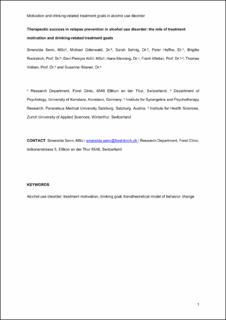Please use this identifier to cite or link to this item:
https://doi.org/10.21256/zhaw-20837| Publication type: | Article in scientific journal |
| Type of review: | Peer review (publication) |
| Title: | Therapeutic success in relapse prevention in alcohol use disorder : the role of treatment motivation and drinking-related treatment goals |
| Authors: | Senn, Smeralda Odenwald, Michael Sehrig, Sarah Haffke, Peter Rockstroh, Brigitte Pereyra Kröll, Devi Menning, Hans Wieber, Frank Volken, Thomas Rösner, Susanne |
| et. al: | No |
| DOI: | 10.1080/10550887.2020.1820810 10.21256/zhaw-20837 |
| Published in: | Journal of Addictive Diseases |
| Volume(Issue): | 39 |
| Issue: | 1 |
| Page(s): | 88 |
| Pages to: | 95 |
| Issue Date: | 2020 |
| Publisher / Ed. Institution: | Taylor & Francis |
| ISSN: | 1055-0887 1545-0848 |
| Language: | English |
| Subjects: | Alcohol use disorder; Treatment motivation; Drinking goal; Transtheoretical model of behavior change |
| Subject (DDC): | 158: Applied psychology 616.8: Neurology, diseases of nervous system |
| Abstract: | Background Changing addictive behavior is a complex process with high demands on motivation. The Transtheoretical Model of Behavior Change provides a theoretical framework for explaining and predicting behavioral change, although its predictive value for addiction is somewhat inconsistent. Objective The aim of the present study is to extend the Transtheoretical Model of Behavior Change by investigating not only treatment motivation but also the predictive value of the type of drinking-related treatment goal. Additional predictors, such as substance-related and sociodemographic variables, are also included in analyses seeking to predict return to drinking during relapse prevention treatment for alcohol use disorder. Methods In this observational study, 99 inpatients from a treatment center for alcohol use disorder were recruited. Treatment motivation was assessed in accordance with the Transtheoretical Model of Behavior Change, drinking-related treatment goal through a self-report questionnaire, and substance-related and sociodemographic variables via the clinic information system. Associations between the potential predictors and covariates were explored using stepwise logistic regression. Results During treatment, 42.6% of participants had at least one relapse. Scoring higher on the action dimension at admission (OR = 0.81, p = .04) and being employed (OR = 0.37, p = .02) were significant predictors of abstinence during treatment. Conclusions This study confirms that treatment motivation contributes to the prediction of treatment outcome, even when controlling for other variables. In future research, the underlying mechanisms of treatment motivation should be further explored. |
| Further description: | This is an Accepted Manuscript of an article published by Taylor & Francis in Journal of Addictive Diseases on 5. Nov 2020, available online: http://www.tandfonline.com/10.1080/10550887.2020.1820810 |
| URI: | https://digitalcollection.zhaw.ch/handle/11475/20837 |
| Fulltext version: | Accepted version |
| License (according to publishing contract): | Licence according to publishing contract |
| Restricted until: | 2021-11-05 |
| Departement: | School of Health Sciences |
| Organisational Unit: | Institute of Public Health (IPH) |
| Appears in collections: | Publikationen Gesundheit |
Files in This Item:
| File | Description | Size | Format | |
|---|---|---|---|---|
| 2020_Senn-etal_Relapse-Prevention-Motivation.pdf | Accepted Version | 346.33 kB | Adobe PDF |  View/Open |
Show full item record
Senn, S., Odenwald, M., Sehrig, S., Haffke, P., Rockstroh, B., Pereyra Kröll, D., Menning, H., Wieber, F., Volken, T., & Rösner, S. (2020). Therapeutic success in relapse prevention in alcohol use disorder : the role of treatment motivation and drinking-related treatment goals. Journal of Addictive Diseases, 39(1), 88–95. https://doi.org/10.1080/10550887.2020.1820810
Senn, S. et al. (2020) ‘Therapeutic success in relapse prevention in alcohol use disorder : the role of treatment motivation and drinking-related treatment goals’, Journal of Addictive Diseases, 39(1), pp. 88–95. Available at: https://doi.org/10.1080/10550887.2020.1820810.
S. Senn et al., “Therapeutic success in relapse prevention in alcohol use disorder : the role of treatment motivation and drinking-related treatment goals,” Journal of Addictive Diseases, vol. 39, no. 1, pp. 88–95, 2020, doi: 10.1080/10550887.2020.1820810.
SENN, Smeralda, Michael ODENWALD, Sarah SEHRIG, Peter HAFFKE, Brigitte ROCKSTROH, Devi PEREYRA KRÖLL, Hans MENNING, Frank WIEBER, Thomas VOLKEN und Susanne RÖSNER, 2020. Therapeutic success in relapse prevention in alcohol use disorder : the role of treatment motivation and drinking-related treatment goals. Journal of Addictive Diseases. 2020. Bd. 39, Nr. 1, S. 88–95. DOI 10.1080/10550887.2020.1820810
Senn, Smeralda, Michael Odenwald, Sarah Sehrig, Peter Haffke, Brigitte Rockstroh, Devi Pereyra Kröll, Hans Menning, Frank Wieber, Thomas Volken, and Susanne Rösner. 2020. “Therapeutic Success in Relapse Prevention in Alcohol Use Disorder : The Role of Treatment Motivation and Drinking-Related Treatment Goals.” Journal of Addictive Diseases 39 (1): 88–95. https://doi.org/10.1080/10550887.2020.1820810.
Senn, Smeralda, et al. “Therapeutic Success in Relapse Prevention in Alcohol Use Disorder : The Role of Treatment Motivation and Drinking-Related Treatment Goals.” Journal of Addictive Diseases, vol. 39, no. 1, 2020, pp. 88–95, https://doi.org/10.1080/10550887.2020.1820810.
Items in DSpace are protected by copyright, with all rights reserved, unless otherwise indicated.